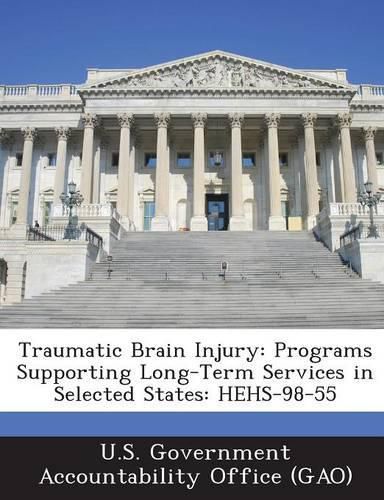Readings Newsletter
Become a Readings Member to make your shopping experience even easier.
Sign in or sign up for free!
You’re not far away from qualifying for FREE standard shipping within Australia
You’ve qualified for FREE standard shipping within Australia
The cart is loading…






Pursuant to a congressional request, GAO reviewed federal and state efforts to provide services the individuals with traumatic brain injury (TBI), focusing on the: (1) primary federal and state programs that provide adults with TBI services to help them function more independently; (2) strategies that states have developed to enhance access to TBI-related services; and (3) circumstances believed to be most frequently associated with difficulty in obtaining services. GAO noted that: (1) adults with TBI receive services to facilitate their reintegration into the community primarily from three federal-state programs: Medicaid, vocational rehabilitation (VR), and Independent Living Services (ILS); (2) Medicaid provides medical, rehabilitation, and social support services to poor individuals with disabilities; (3) VR agencies provide services to individuals with disabilities to prepare them for and support them during the transition to employment; (4) ILS programs provide skills training to individuals with disabilities to facilitate their independence in the community; (5) all three programs are financed by a combination of federal and state funds and serve a range of individuals with disabilities, only a small number of whom have a TBI; (6) because most of the services covered by standard Medicaid programs are medical, all states have expanded Medicaid services through home and community-based waivers, which permit them to offer additional services–such as homemaker services, adult day care, and nonmedical transportation–to persons at risk of institutionalization; (7) these Medicaid waivers generally target long-term community-based services to a broad population, such as the physically disabled or disabled elderly; (8) recognizing the difficulties adults with TBI experience in accessing services, each of the states GAO contacted have developed various strategies to target services to adults with TBI; (9) five target Medicaid services specifically to limited numbers of adults with TBI; (10) despite these strategies, service gaps are likely–the number of adults with TBI who are provided services remains small relative to estimates of the total number; (11) according to program representatives and experts, those most likely to have difficulty accessing services are: (a) individuals with cognitive impairment but who lack physical disabilities; (b) individuals without an effective advocate to negotiate the social service system or without a social support system; and © individuals with problematic or unmanageable behaviors, such as aggression, destructiveness, or participation in illegal behaviors; and (12) without treatment, individuals with problematic or unmanageable behaviors are the most likely to become homeless, institutionalized in a mental facility, or imprisoned.
$9.00 standard shipping within Australia
FREE standard shipping within Australia for orders over $100.00
Express & International shipping calculated at checkout
Pursuant to a congressional request, GAO reviewed federal and state efforts to provide services the individuals with traumatic brain injury (TBI), focusing on the: (1) primary federal and state programs that provide adults with TBI services to help them function more independently; (2) strategies that states have developed to enhance access to TBI-related services; and (3) circumstances believed to be most frequently associated with difficulty in obtaining services. GAO noted that: (1) adults with TBI receive services to facilitate their reintegration into the community primarily from three federal-state programs: Medicaid, vocational rehabilitation (VR), and Independent Living Services (ILS); (2) Medicaid provides medical, rehabilitation, and social support services to poor individuals with disabilities; (3) VR agencies provide services to individuals with disabilities to prepare them for and support them during the transition to employment; (4) ILS programs provide skills training to individuals with disabilities to facilitate their independence in the community; (5) all three programs are financed by a combination of federal and state funds and serve a range of individuals with disabilities, only a small number of whom have a TBI; (6) because most of the services covered by standard Medicaid programs are medical, all states have expanded Medicaid services through home and community-based waivers, which permit them to offer additional services–such as homemaker services, adult day care, and nonmedical transportation–to persons at risk of institutionalization; (7) these Medicaid waivers generally target long-term community-based services to a broad population, such as the physically disabled or disabled elderly; (8) recognizing the difficulties adults with TBI experience in accessing services, each of the states GAO contacted have developed various strategies to target services to adults with TBI; (9) five target Medicaid services specifically to limited numbers of adults with TBI; (10) despite these strategies, service gaps are likely–the number of adults with TBI who are provided services remains small relative to estimates of the total number; (11) according to program representatives and experts, those most likely to have difficulty accessing services are: (a) individuals with cognitive impairment but who lack physical disabilities; (b) individuals without an effective advocate to negotiate the social service system or without a social support system; and © individuals with problematic or unmanageable behaviors, such as aggression, destructiveness, or participation in illegal behaviors; and (12) without treatment, individuals with problematic or unmanageable behaviors are the most likely to become homeless, institutionalized in a mental facility, or imprisoned.